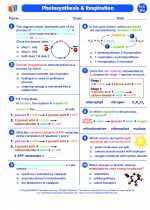Glands
A gland is a group of cells or an organ in the body that synthesizes substances (such as hormones) for release into the bloodstream, cavities, or onto the body surface. There are two main types of glands: exocrine glands and endocrine glands.
Exocrine Glands
Exocrine glands secrete their products into ducts, which then carry the secretions to the body's surface or into body cavities. Examples of exocrine glands include sweat glands, salivary glands, and mammary glands.
Endocrine Glands
Endocrine glands secrete hormones directly into the bloodstream. These hormones then travel to target tissues or organs where they regulate various physiological processes. Examples of endocrine glands include the pituitary gland, thyroid gland, and adrenal glands.
Study Guide
- What is a gland?
- What are the two main types of glands?
- Give an example of an exocrine gland.
- Give an example of an endocrine gland.
- How do exocrine glands release their products?
- How do endocrine glands release their products?
- What is the function of hormones released by endocrine glands?
[Glands] Related Worksheets and Study Guides:
.◂Biology Worksheets and Study Guides High School. Photosynthesis and respiration
Worksheet/Answer key Photosynthesis and respiration
Photosynthesis and respiration  Worksheet/Answer key
Worksheet/Answer key Photosynthesis and respiration
Photosynthesis and respiration  Worksheet/Answer key
Worksheet/Answer key Photosynthesis and respiration
Photosynthesis and respiration  Worksheet/Answer key
Worksheet/Answer key Photosynthesis and respiration
Photosynthesis and respiration  Vocabulary/Answer key
Vocabulary/Answer key Photosynthesis and respiration
Photosynthesis and respiration  Vocabulary/Answer key
Vocabulary/Answer key Photosynthesis and respiration
Photosynthesis and respiration 

 Worksheet/Answer key
Worksheet/Answer key
 Worksheet/Answer key
Worksheet/Answer key
 Worksheet/Answer key
Worksheet/Answer key
 Vocabulary/Answer key
Vocabulary/Answer key
 Vocabulary/Answer key
Vocabulary/Answer key

The resources above cover the following skills:
LIFE SCIENCE (NGSS)
From Molecules to Organisms: Structures and Processes
Students who demonstrate understanding can:
Use a model to illustrate how photosynthesis transforms light energy into stored chemical energy.
Ecosystems: Interactions, Energy, and Dynamics
Students who demonstrate understanding can:
Develop a model to illustrate the role of photosynthesis and cellular respiration in the cycling of carbon among the biosphere, atmosphere, hydrosphere, and geosphere.